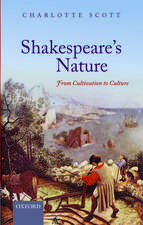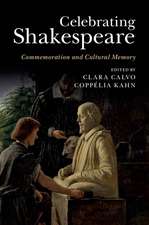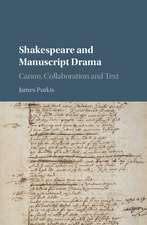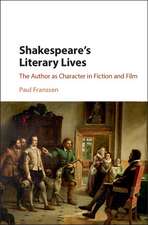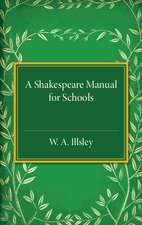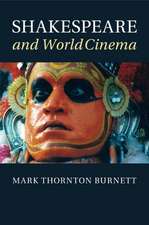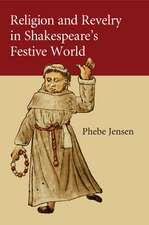Teaching Shakespeare: Cambridge School Shakespeare
Autor Rex Gibsonen Limba Engleză Paperback – 2 noi 2016
| Toate formatele și edițiile | Preț | Express |
|---|---|---|
| Paperback (3) | 177.51 lei 3-5 săpt. | +16.56 lei 6-10 zile |
| Cambridge University Press – 25 feb 1998 | 177.51 lei 3-5 săpt. | +16.56 lei 6-10 zile |
| Cambridge University Press – 20 apr 2016 | 195.21 lei 3-5 săpt. | +17.94 lei 6-10 zile |
| Klett Sprachen GmbH – 2 noi 2016 | 208.30 lei 17-23 zile | +19.34 lei 6-10 zile |
Din seria Cambridge School Shakespeare
-
 Preț: 68.10 lei
Preț: 68.10 lei -
 Preț: 70.04 lei
Preț: 70.04 lei -
 Preț: 177.51 lei
Preț: 177.51 lei -
 Preț: 69.12 lei
Preț: 69.12 lei -
 Preț: 68.54 lei
Preț: 68.54 lei -
 Preț: 168.57 lei
Preț: 168.57 lei -
 Preț: 69.55 lei
Preț: 69.55 lei -
 Preț: 69.97 lei
Preț: 69.97 lei -
 Preț: 70.04 lei
Preț: 70.04 lei -
 Preț: 71.95 lei
Preț: 71.95 lei -
 Preț: 70.51 lei
Preț: 70.51 lei -
 Preț: 70.27 lei
Preț: 70.27 lei -
 Preț: 71.14 lei
Preț: 71.14 lei -
 Preț: 70.27 lei
Preț: 70.27 lei -
 Preț: 71.48 lei
Preț: 71.48 lei -
 Preț: 70.04 lei
Preț: 70.04 lei -
 Preț: 70.23 lei
Preț: 70.23 lei -
 Preț: 70.27 lei
Preț: 70.27 lei -
 Preț: 70.51 lei
Preț: 70.51 lei -
 Preț: 72.03 lei
Preț: 72.03 lei -
 Preț: 70.46 lei
Preț: 70.46 lei -
 Preț: 71.80 lei
Preț: 71.80 lei -
 Preț: 69.08 lei
Preț: 69.08 lei -
 Preț: 178.92 lei
Preț: 178.92 lei -
 Preț: 117.24 lei
Preț: 117.24 lei -
 Preț: 118.93 lei
Preț: 118.93 lei -
 Preț: 118.55 lei
Preț: 118.55 lei -
 Preț: 291.83 lei
Preț: 291.83 lei - 23%
 Preț: 550.23 lei
Preț: 550.23 lei -
 Preț: 190.41 lei
Preț: 190.41 lei -
 Preț: 71.89 lei
Preț: 71.89 lei -
 Preț: 85.39 lei
Preț: 85.39 lei
Preț: 208.30 lei
Nou
Puncte Express: 312
Preț estimativ în valută:
39.86€ • 40.82$ • 33.16£
39.86€ • 40.82$ • 33.16£
Carte disponibilă
Livrare economică 22-28 februarie
Livrare express 11-15 februarie pentru 29.33 lei
Preluare comenzi: 021 569.72.76
Specificații
ISBN-13: 9783125764446
ISBN-10: 3125764440
Pagini: 211
Dimensiuni: 190 x 246 x 12 mm
Greutate: 0.47 kg
Editura: Klett Sprachen GmbH
Seria Cambridge School Shakespeare
ISBN-10: 3125764440
Pagini: 211
Dimensiuni: 190 x 246 x 12 mm
Greutate: 0.47 kg
Editura: Klett Sprachen GmbH
Seria Cambridge School Shakespeare
Cuprins
Foreword; Introduction: Active methods; Teaching Shakespeare: an overview; 1. Why teach Shakespeare?: Abiding and familiar concerns; Student development; Language; Otherness; 2. Principles: Treat Shakespeare as a script; Make Shakespeare learner-centred; Shakespeare is social; Shakespeare celebrates imagination; Shakespeare is physical; Make Shakespeare exploratory; Address the distinctive qualities of the play; Choice and variety; Shakespeare and plurality; Negative capability; Shakespeare is about enjoyment; 3. Perspectives: Feminism; Psychoanalysis; Structuralism; Deconstruction; Political perspectives; Reception theory; Using perspectives; 4. Shakespeare's language: Introduction; Dramatic language; Imagery; Personification; Antithesis; Repetition; Rhyme; Lists; Verse; Prose; Rhetoric; Bombast; Hyperbole; Irony; Oxymoron; Puns; Malapropism; Monosyllables; Pronouns; Changing language; Inventing language; Everyday language; Two types of language; The development of Shakespeare's language; The Sonnets; 5. Story: The Story of the play; Enacting the story; Stories in the play; Recapitulating the story; Point of view narratives; Ariel's story; 6. Character: Introduction; Fundamental questions; Complexity of character; Language and character; Introduction to activities; Cast the play; Job interviews; Absent characters; This is your life; Obituaries; Point of view; Hot-seating; Public and private; Props; Free-wheeling associations; List of characters; Ranking characters; Journeys through the play; Relationships; Exploring character; Character types; Character names; 7. Themes: Introduction; Four common themes; Levels; Particular themes; Fathers and daughters; Acting and theatre; 8. Stagecraft: Introduction; Stage directions; Critical incidents; Creating atmosphere; Opening scenes; 9. Active methods: Content; The teacher's role; Organising the classroom; Introduction to activities; Acting a scene; Beginning the play; Sense units; Speaking Shakespeare; Teacher leading; Five investigations; Sections and headlines; Student as director; Point of view: theory; Improvisations; Warm-ups; A memory game; Tableaux; Chroal speaking; Insults; Using films; Trials and inquiries; Writing and design; Sequencing; Shakespeare's life and times; Theatre visits; Staging a Shakespeare play; Shakespeare festivals; Researching the classics; Other resources; 10. Shakespeare for younger students: Introduction; Shakespeare's life and times; Storytelling; Dramatic storytelling; A co-ordinated approach across the curriculum; A Shakespeare term; A puppet Macbeth; 11. Assessment: Process or product? Principles; Student self-assessment; Assessment of performance; Essays; Assessment tasks; Examinations; Evaluating a lesson; Quotations used in the text; Index
Descriere
Descriere de la o altă ediție sau format:
Invaluable support for all teachers of Shakespeare in schools, colleges and institutions of higher education.
Invaluable support for all teachers of Shakespeare in schools, colleges and institutions of higher education.



